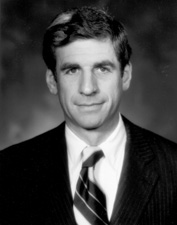John Danforth Citations
John Danforth: Citations en anglais
“God's purpose exceeds whatever we can put in an agenda.”
Page 189
Faith and Politics (2006)
Contexte: It is concern that precedes and inspires agendas, and survives when agendas fail, and it causes us to try again, always trying our best, never certain about our own judgment. It is knowing that God's purpose exceeds whatever we can put in an agenda.
Page 53
Faith and Politics (2006)
Page 16
Faith and Politics (2006)
Contexte: Whether religion is a divisive or reconciling force depends on our certainty or our humility as we practice our faith in our politics. If we believe that we know God's truth and that we can embody that truth in a political agenda, we divide the realm of politics into those who are on God's side, which is our side, and those with whom we disagree, who oppose the side of God. This is neither good religion nor good politics. It is not consistent with following a Lord who reached out to a variety of people — prostitutes, tax collectors, lepers. If politics is the art of compromise, certainty is not really politics, for how can one compromise with God's own truth? Reconciliation depends on acknowledging that God's truth is greater than our own, that we cannot reduce it to any political platform we create, no matter how committed we are to that platform, and that God's truth is large enough to accommodate the opinions of all kinds of people, even those with whom we strongly disagree.
Op-Ed essay "In the Name of Politics", in The New York Times (30 March 2005) http://www.nytimes.com/2005/03/30/opinion/30danforth.html
Contexte: As a senator, I worried every day about the size of the federal deficit. I did not spend a single minute worrying about the effect of gays on the institution of marriage. Today it seems to be the other way around.
Page 166
Faith and Politics (2006)
Page 16
Faith and Politics (2006)
Contexte: Whether religion is a divisive or reconciling force depends on our certainty or our humility as we practice our faith in our politics. If we believe that we know God's truth and that we can embody that truth in a political agenda, we divide the realm of politics into those who are on God's side, which is our side, and those with whom we disagree, who oppose the side of God. This is neither good religion nor good politics. It is not consistent with following a Lord who reached out to a variety of people — prostitutes, tax collectors, lepers. If politics is the art of compromise, certainty is not really politics, for how can one compromise with God's own truth? Reconciliation depends on acknowledging that God's truth is greater than our own, that we cannot reduce it to any political platform we create, no matter how committed we are to that platform, and that God's truth is large enough to accommodate the opinions of all kinds of people, even those with whom we strongly disagree.
Page 124
Faith and Politics (2006)
Page 186
Faith and Politics (2006)
Page 2
Faith and Politics (2006)
Page 72
Faith and Politics (2006)
Page 180
Faith and Politics (2006)
Page 215
Faith and Politics (2006)
Page 66
Faith and Politics (2006)
Page 47
Faith and Politics (2006)
Page 95
Faith and Politics (2006)
Page 125
Faith and Politics (2006)
Page 10
Faith and Politics (2006)
“I was raised in a Republican household during the glory days of "I like Ike!””
I am currently an independent voter who votes on the integrity of the individual and the facts surrounding the issues. I have read the Mueller Report, and recently listened to the televised Congressional Mueller hearings, and listened to analysis by both CNN and Fox. As a citizen, I have come to the conclusion that President Trump attempted to obstruct Mueller’s investigation in multiple ways.
The OLC opinion blocked Mueller from indicting a sitting president, but he stated that an ordinary citizen facing these charges would face a criminal indictment.
It’s up to us to decide and act on Trump (2019)
